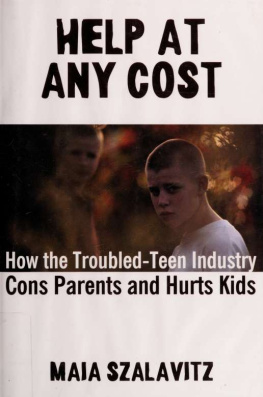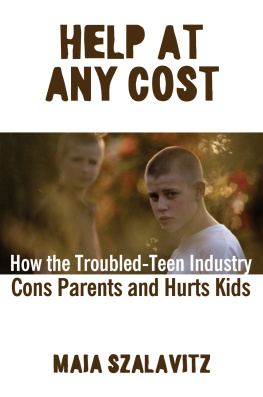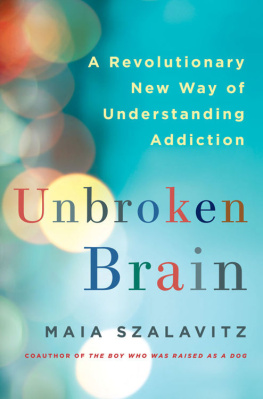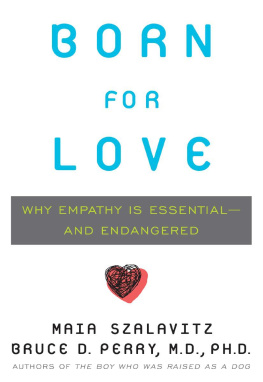Maia Szalavitz - Help at any cost
Here you can read online Maia Szalavitz - Help at any cost full text of the book (entire story) in english for free. Download pdf and epub, get meaning, cover and reviews about this ebook. year: 2006, publisher: Riverhead, genre: Home and family. Description of the work, (preface) as well as reviews are available. Best literature library LitArk.com created for fans of good reading and offers a wide selection of genres:
Romance novel
Science fiction
Adventure
Detective
Science
History
Home and family
Prose
Art
Politics
Computer
Non-fiction
Religion
Business
Children
Humor
Choose a favorite category and find really read worthwhile books. Enjoy immersion in the world of imagination, feel the emotions of the characters or learn something new for yourself, make an fascinating discovery.
- Book:Help at any cost
- Author:
- Publisher:Riverhead
- Genre:
- Year:2006
- Rating:5 / 5
- Favourites:Add to favourites
- Your mark:
- 100
- 1
- 2
- 3
- 4
- 5
Help at any cost: summary, description and annotation
We offer to read an annotation, description, summary or preface (depends on what the author of the book "Help at any cost" wrote himself). If you haven't found the necessary information about the book — write in the comments, we will try to find it.
Help at any cost — read online for free the complete book (whole text) full work
Below is the text of the book, divided by pages. System saving the place of the last page read, allows you to conveniently read the book "Help at any cost" online for free, without having to search again every time where you left off. Put a bookmark, and you can go to the page where you finished reading at any time.
Font size:
Interval:
Bookmark:

This book made available by the Internet Archive.





For my father, Miklos Szalavitz, whom I miss terribly, and for "troubled teens, who need to be heard, not harmed



What we do to our children, they will do to society.
PLINY THE ELDER

Introduction
A dolescence strikes fear in the hearts of even the best parents and raising a teenager, even in ideal circumstances, involves many conflicts and constant worry. But what should you do if your son becomes so out-of-control, so defiant, so irresponsible and impulsive that you know hes not just a typical rebellious teen? What can you do if your daughter refuses to just say no, runs away, risks pregnancy? Where should you turn when the archetypal troubled teen is your child?
Over the last four decades, a multibillion-dollar industry 1 has arisen that claims to answer these questions and promises peace to parents who send their children to residential facilities for tough love. These behavior modification programs offer hope to parents who have become desperate, who feel the need for drastic solutions, who have lost faith in the mental health system and perhaps in their own ability to provide effective discipline. For parents whose teens are not yet in deep trouble, the programs claim preventive powerswhich amounts to promising an all
H EJL P AT ANY COST
purpose answer for any type of adolescent difficulty from depression or minor drug use to out-of-control aggression and defiance. With draconian discipline, they promise to whip difficult kids into shape.
Andrea Bradbury* was one obvious candidate for a tough love program. Her parents, a Florida postal worker and a school lunchroom manager, grew increasingly frustrated by their adopted daughters mood swings and disobedient behavior, which intensified during her teen years. Her apparent promiscuity was troublingespecially when she began running away from home to be with her various boyfriends. The Bradburys spent many late nights waiting for word about her whereabouts, desperately wanting the phone to ring but also frightened about what news it might bring. They suspected, too, that Andreas problems were negatively affecting her younger brother, Richard. Andrea just wouldnt follow the rules, wouldnt listen, and wouldnt respond to discipline. Why wasnt their daughter getting the message? What would it take to get through to her?
Bob and Sally Bacon were also deeply concerned about their sixteen-year-old son, Aaron. Bob, an architect, and Sally, who worked various jobs, lived in an upscale neighborhood in Phoenix. Aaron had been a brilliant student and was a popular boy with a sunny personality. But when he hit his sophomore year of high school, his disposition turned darker. His grades sank. He became sullen, taciturn, and dishonest. The Bacons tried family therapy, but nothing seemed to reach him. Bob and Sally had always believed in explaining their values, in talking things out, reasoning everything through. But they worried they had been too soft. Did Aaron need them to put their foot down?
The problem of difficult, misbehaving teens is one that affects all kinds of families. No matter how ignorant or educated a parent you are, when its your child at risk, when your beloved baby has grown into someone you desperately want to protect but can no longer understand,
throughout this book, an asterisk at first mention of a name indicates that the persons real name is not used.
INTRODUCTION
you can become vulnerable to someone who offers answers, especially answers that dont imply mental illness, since there is still such tremendous stigma attached to psychiatric disorders. And adding to parents quite understandable reluctance to expose themselves to judgment and shame is the fact that treatments for mental and behavioral problems are underfunded, misunderstood, and underresearched. Consequently, its difficult even to know what type of help to seek, more challenging to find providers who utilize the best practices if you do manage to learn about them, and difficult to afford help if quality treatment can be located.
This is where tough love programs come in. Their main message is this: Todays teens are so out-of-control and so morally compromised that only extremely harsh, perhaps even brutal tactics can keep them in line. A bit of cruelty is necessary, even kindsignifying good parenting, the opposite of abuse. Whether you have been a lenient parent or a strict one doesnt matter, its not your fault: even the best parenting can be overcome by outside pressures. Awash in Americas cultural morass, parents have become too swamped to discipline effectively. And the answer, according to tough love proponents, is that troubled children need to be removed from this toxic environment, isolated, infantilized, and re-parented, returned only when they are fully prepared to comply with family rules. To prevent backsliding after treatment, parents are instructed on how to lay down and enforce the law, to make family membership itself contingent on total cooperation.
Tough love residential programs guarantee resultsto turn rebellion into happy obedience, defiance into self-disciplineto parents who take their advice. They offer parental absolution: its the child, inevitably influenced by a decadent and invasive culture, who is at fault, the child who must be sent off to be treated, although, of course, the parents must participate fully in the solution.
Parents who choose such treatment are rarely aware that theres no scientific evidence that favors it, nor do they tend to know about its troubled history marked by abuse and family disruption. They are also unlikely to be informed about how tough love programs almost invariably exaggerate the risks troubled teens face and inflate the severity of
HELP AT ANY COST
their childrens particular problems in order to make the sale. They rarely even know, in fact, just who benefits from referring them to a particular program. In this industry, many programs quietly pay satisfied parents and seemingly objective educational consultants for recommendations, online endorsements, and enrollments.
And because of the shame that surrounds seeking help for teen behavioral problems, parents often dont activate the social networks that they would normally use to seek the best care if, for example, a child had cancer. Worse, the media has been complicit in keeping them in the dark. It has accepted programs unsubstantiated claims of widespread success as evidence for efficacy instead of demanding scientific proof. Consequently, for the past four decades, the troubled-teen industry, pushing the philosophy of tough love, has profited from parental shame, media complacency, and government antidrug hyperbole, exploiting families desperation, fear, and ignorance.
Font size:
Interval:
Bookmark:
Similar books «Help at any cost»
Look at similar books to Help at any cost. We have selected literature similar in name and meaning in the hope of providing readers with more options to find new, interesting, not yet read works.
Discussion, reviews of the book Help at any cost and just readers' own opinions. Leave your comments, write what you think about the work, its meaning or the main characters. Specify what exactly you liked and what you didn't like, and why you think so.











